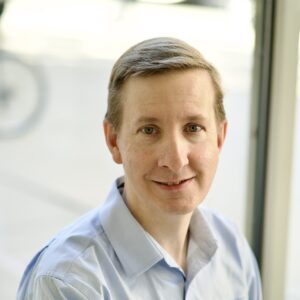
Name: Britton Plourde
Title, including department and school you work in: Professor of Physics, College of Letters & Science
Hometown: Reston, VA
Educational/professional background: Professor of Physics at Syracuse University (2005-2024), Postdoctoral Research Scientist at University of California, Berkeley (2000-2004), PhD in Physics at University of Illinois at Urbana-Champaign (2000), BS in Physics at University of Michigan (1993); also, Master of Music at University of Illinois at Urbana-Champaign (1999) and Bachelor of Music at University of Michigan (1993)
What is your field of research, and how did you get into it? I study the physics of superconducting quantum circuits for building a quantum computer. Serious efforts to develop superconductor-based quantum computing started after the implementation of the first superconducting qubit at NEC in Japan in 1999. Fortunately for me, I was completing my PhD on superconductor physics and devices around this time and was able to start a postdoctoral position in 2000 working on some early superconducting qubits. The growth in the field in the ensuing years has been tremendous, and it continues to be a thriving and exciting research area.
What attracted you to UW–Madison? The university has long been a leader in the field of quantum computing with many dynamic research groups representing several different key qubit technologies. Besides joining the UW–Madison Physics faculty, I was also able to join a new Madison-based quantum computing startup company, Qolab, that was co-founded by my long-time collaborator, Robert McDermott, along with John Martinis and Alan Ho.
What was your first visit to campus like? I have collaborated with Robert McDermott for many years, so I have visited Madison many times. I always enjoy many aspects of the university, including the collegial research atmosphere in the Physics Department, the beauty of the campus, and the proximity to the wonderful lakes.
What’s the most important lesson you wish to convey to students? Finding a research problem that you are passionate about is key to being able to persevere when faced with inevitable experimental challenges and setbacks.
Does your work relate in any way to the Wisconsin Idea? If so, please describe how. My lab tackles hard challenges that, once solved, could enable the construction of large-scale quantum computers that are potentially able to solve problems that are intractable on conventional supercomputers. Fault-tolerant quantum computers could eventually lead to breakthroughs with positive impacts on the people of Wisconsin and beyond, including the discovery of new pharmaceuticals and materials. My work at Qolab is contributing to the development of a quantum ecosystem in Wisconsin, with broad benefits to the state, creating high-tech jobs and helping to make Wisconsin a key contributor in this important technological area.
What’s something interesting about your area of expertise you can share that will make us sound smarter at parties? Superconducting integrated circuits are a great way to engineer artificial atoms that can interact and form a quantum computer.
Hobbies/other interests: Throughout college and graduate school, I pursued parallel career paths as a scientist and musician. I still play the flute regularly, but I haven’t performed professionally much since finishing graduate school.